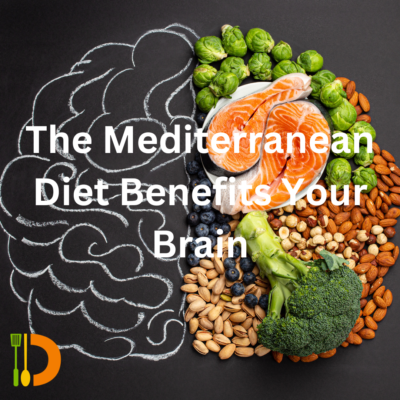Mediterranean Diet Benefits
June 24, 2024
The Mediterranean diet can potentially slow cognitive decline, reduce Alzheimer’s risk, and protect the brain from damage caused by Alzheimer’s 6. June is Alzheimer’s and Brain Awareness Month. According to the Alzheimer’s Association, 7 million Americans are living with Alzheimer’s, and by 2050, individuals living with Alzheimer’s are projected to increase by 13 million1.
Scientists are taking steps to identify preventative measures to cease the development of Alzheimer’s as the rate of incidences is projected to grow. Research proposes that chronic inflammation of the brain can lead to Alzheimer’s6.
Where does the Mediterranean diet originate?
The concept of the Mediterranean diet was brought forth by Ancel Keys during a study called the “Seven Countries Study,” which showed the association between the diet patterns of different cultures and cardiovascular diseases in 19584. The study focused on cohorts from Croatia, Greece, and Italy, but the diet incorporates eating patterns from the 21 countries that border the Mediterranean Sea, such as Albania, Algeria, Slovenia, Croatia, and Morocco4.
Will this diet work for me?
Aspects of the Mediterranean diet may or may not work for you, especially since it is not tailored individually. The diet does not have to be followed to a “T”, but if you’re looking to make changes to your dietary intake, this diet has many health benefits. Continue reading to learn if this diet works for you!
What does the Mediterranean Diet focus on?
The Mediterranean diet emphasizes plant-based foods and omega-3s, which support brain health and lower the risk of cardiovascular disease10. The dietary recommendations are outlined below.

Fruits and Vegetables:
Contain antioxidant properties from vitamins A,C and E and minerals such as zinc and copper that protect your body from free radicals. Free radicals can cause oxidative stress, which is shown to be a precursor to chronic diseases such as neurodegeneration, cancer, cardiovascular disease, and arthritis. Consuming high-fiber foods and whole grains is essential for reducing inflammation3,9.
Minimum of four servings but should aim between four to eight servings per day of nonstarchy vegetables equal to ½ cup cooked or 1 cup raw, such as Beets, Broccoli, cabbage, carrots, tomatoes, and greens2,5.
You should aim for a minimum of three servings of fruit per day, but you should aim for three or more servings. A serving size is equal to a small whole fruit, ½ cup of 100% fruit juice, or ¼ cup of dried fruit2,5.
Omega-3s and Protein:
Omega-3 is a polyunsaturated fat essential for heart, brain, and eye health8. Sources of omega-3 are found in fish, and for those following a more vegetarian or vegan lifestyle, you can find omega-3s in plant-based proteins Sources are found in fresh and canned salmon, tuna, and sardines, and most nuts, seeds, and legumes, such as walnuts, chia seeds, pinto, and kidney beans8.
The Mediterranean diet recommends the following for animal-based and plant-based protein2,5:
- Fish (salmon, tuna, sardines): Three servings per week, 3oz to 4 oz.
- Skinless poultry (chicken and turkey breast): One to three times per week, 3 oz.
- Red Meat: One 3oz serving a week.
- *Serving sizes can be visualized as a deck of cards or the palm of your hand.
- Legumes, Nuts, and Seeds: Three ½ cup servings a week.
Fats:
Extra Virgin Olive oil is one of the main sources of added fats in the Mediterranean diet. Although olive oil can be pricey, canola and soybean oils are lower-cost oils that also contain good sources of omega-3s.
Dairy:
Low-fat dairy is recommended; the calcium in dairy is beneficial for the functions of nerves, and muscles and supports bones and teeth growth and maintenance7.
One to three servings of low-fat dairy is recommended. One serving is equal to 1 cup of skim milk and non-fat or greek yogurt or 1 oz of low-fat cheese. If you’re unable to consume dairy products, calcium and vitamin D fortified plant-based “milk” and yogurt are great alternatives.
The Bottom Line:
The Mediterranean diet focuses on consuming adequate amounts of plant-based foods, omega-3s, and whole grains. This eating pattern should be thought of as a lifestyle and less as a diet. Incorporating nutritious foods into your daily habits can lead to a healthier body and a happy mind.
If you’d like help implementing lifestyle changes that reflect the Mediterranean diet, schedule a discovery call today to find out more about how a dietitian can help.
Melise Gresham, Miami University Dietetic Intern
Sources
- Alzheimer’s Association. (2024). Alzheimer’s disease facts and figures. Retrieved from Alzheimer’s Disease and Dementia website: https://www.alz.org/alzheimers-dementia/facts-figures
- Cleveland Clinic. (2022b, November 20). Mediterranean Diet. Retrieved from Cleveland Clinic website: https://my.clevelandclinic.org/health/articles/16037-mediterranean-diet
- Drewnowski, A., McKeown, N., Kissock, K., Beck, E., Mejborn, H., Vieux, F., … Seal, C. J. (2021). Perspective: Why Whole Grains Should Be Incorporated into Nutrient-Profile Models to Better Capture Nutrient Density. Advances in Nutrition, 12(3), 600–608. https://doi.org/10.1093/advances/nmaa172
- Keys, A. (1958). Seven Countries Study | The first study to relate diet with cardiovascular disease. – The Seven Countries Study (SCS for short) is the first major study to look at dietary components and patterns and lifestyle as risk factors for cardiovascular disease, over multiple countries and extended periods of time. Retrieved from Seven Countries Study | The first study to relate diet with cardiovascular disease. website: https://www.sevencountriesstudy.com/
- Mediterranean Food Guide. (2019). Retrieved from https://assets.ctfassets.net/4yx69hifndy8/410.pdf/e4054c0bd724a2c047d786b183dda8d9/410.pdf
- MIND and Mediterranean diets linked to fewer signs of Alzheimer’s brain pathology. (2023, May 4). Retrieved from National Institute on Aging website: https://www.nia.nih.gov/news/mind-and-mediterranean-diets-linked-fewer-signs-alzheimers-brain-pathology
- National Institutes of Health. (2019, December 6). Office of Dietary Supplements – Calcium. Retrieved from Nih.gov website: https://ods.od.nih.gov/factsheets/Calcium-Consumer/
- National Institutes of Health. (2022, July 18). Office of Dietary Supplements – Omega-3 Fatty Acids. Retrieved from Nih.gov website: https://ods.od.nih.gov/factsheets/Omega3FattyAcids-Consumer/
- Pham-Huy, L. A., He, H., & Pham-Huy, C. (2008). Free Radicals, Antioxidants in Disease and Health. International Journal of Biomedical Science : IJBS, 4(2), 89–96. Retrieved from https://www.ncbi.nlm.nih.gov/pmc/articles/PMC3614697/#:~:text=At%20high%20concentrations%2C%20they%20generate
- Tosti, V., Bertozzi, B., & Fontana, L. (2017). Health Benefits of the Mediterranean Diet: Metabolic and Molecular Mechanisms. The Journals of Gerontology. Series A, Biological Sciences and Medical Sciences, 73(3), 318–326. https://doi.org/10.1093/gerona/glx227
Subscribe to our newsletter
Get seasonal recipes, new trends in food and fitness, and dietitian jokes. There’s no spam, and you can unsubscribe at any time.
